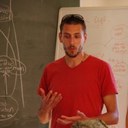Thesis defence by Leon Marshall
- https://ilee.unamur.be/events/thesis-defence-by-leon-marshall
- Thesis defence by Leon Marshall
- 2018-10-26T16:00:00+02:00
- 2018-10-26T18:00:00+02:00
- Wild bee biodiversity patterns across space and time: the role of land use/land cover and climate
- When Oct 26, 2018 from 04:00 PM to 06:00 PM (Europe/Brussels / UTC200)
- Where Amphitheatre PA02
-
Add event to calendar
 iCal
iCal
 Rapid anthropogenic environmental changes have a widespread detrimental effect on global patterns of biodiversity. Climate change and land use/land cover (LULC) change have long been recognized as two of the drivers of biodiversity loss and shifts in species’ distributions. Climate and LULC changes can alter species’ habitats through changes in temperature, rainfall and extreme weather patterns, and land conversions from areas rich in resources to areas with insufficient resources. Species are then forced to move into in areas with tolerable conditions and adequate resources or face local extinction. To be able to interpret historical dynamics, recognize present day patterns, and predict changes under potential futures, it is essential to understand in detail climate and LULC requirements of different species at a variety of different extents and locations.
Rapid anthropogenic environmental changes have a widespread detrimental effect on global patterns of biodiversity. Climate change and land use/land cover (LULC) change have long been recognized as two of the drivers of biodiversity loss and shifts in species’ distributions. Climate and LULC changes can alter species’ habitats through changes in temperature, rainfall and extreme weather patterns, and land conversions from areas rich in resources to areas with insufficient resources. Species are then forced to move into in areas with tolerable conditions and adequate resources or face local extinction. To be able to interpret historical dynamics, recognize present day patterns, and predict changes under potential futures, it is essential to understand in detail climate and LULC requirements of different species at a variety of different extents and locations.
 Wild bees represent an ideal study organism to explore these themes. Wild bee species are needed to pollinate the majority of wild flowers and can greatly influence crop pollination, supporting food provisioning for humans. Wild bees have also experienced significant changes in many areas over the last decades, showing large shifts in their distribution patterns, declines in diversity and abundance, and many local extinctions. In order to protect wild bees and miti- gate the influence of rapid global changes, it is necessary to quantify the influence of LULC and climate effects on wild bees. Consequently, the general objective of this thesis is to examine how LULC and climate conditions impact the diversity and distribution patterns of wild bee species at different spatial and temporal scales.
Wild bees represent an ideal study organism to explore these themes. Wild bee species are needed to pollinate the majority of wild flowers and can greatly influence crop pollination, supporting food provisioning for humans. Wild bees have also experienced significant changes in many areas over the last decades, showing large shifts in their distribution patterns, declines in diversity and abundance, and many local extinctions. In order to protect wild bees and miti- gate the influence of rapid global changes, it is necessary to quantify the influence of LULC and climate effects on wild bees. Consequently, the general objective of this thesis is to examine how LULC and climate conditions impact the diversity and distribution patterns of wild bee species at different spatial and temporal scales.
Leon will present the results of his thesis he conducted in the Department of Geography under the supervision of Nicolas Dendoncker.
 Institute of Life, Earth and Environment
Institute of Life, Earth and Environment
